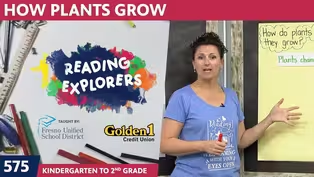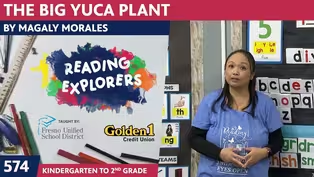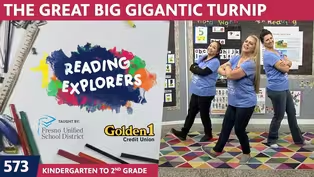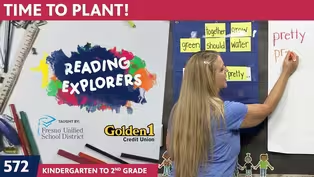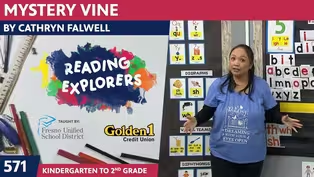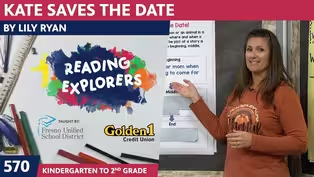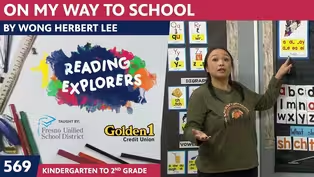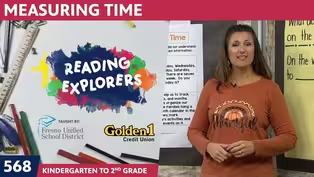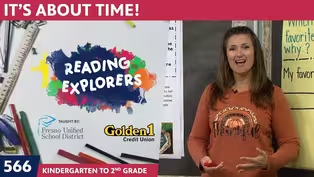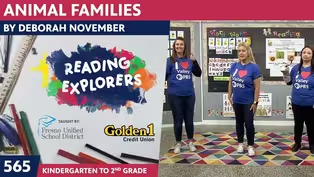
3-381: Suffixes '-able' & '-ment'
Season 3 Episode 461 | 14m 2sVideo has Closed Captions
Join Mrs. Nix at Camp Discovery!
Third Grade teacher, Mrs. Nix, welcomes students back to Camp Discovery, a fun learning space packed with reading adventures & fun games!
Problems playing video? | Closed Captioning Feedback
Problems playing video? | Closed Captioning Feedback
Reading Explorers is a local public television program presented by Valley PBS

3-381: Suffixes '-able' & '-ment'
Season 3 Episode 461 | 14m 2sVideo has Closed Captions
Third Grade teacher, Mrs. Nix, welcomes students back to Camp Discovery, a fun learning space packed with reading adventures & fun games!
Problems playing video? | Closed Captioning Feedback
How to Watch Reading Explorers
Reading Explorers is available to stream on pbs.org and the free PBS App, available on iPhone, Apple TV, Android TV, Android smartphones, Amazon Fire TV, Amazon Fire Tablet, Roku, Samsung Smart TV, and Vizio.
Providing Support for PBS.org
Learn Moreabout PBS online sponsorshipMore from This Collection
Valley PBS and Fresno Unified School District have partnered with Golden 1 Credit Union to create Reading Explorers Lessons for grades Pre-Kindergarten through Third grade. The daily lessons will be taught by Fresno Unified School District teachers and are created to help students practice their reading skills and reinforce lessons during distance learning.
Video has Closed Captions
Learn about the life cycle of a plant on Reading Explorers. (26m 39s)
K-2-574: The Big Yuca Plant by Magaly Morales
Video has Closed Captions
Join the Reading Explorers as we adventure into a new book The Big Yuca Plant. (26m 30s)
K-2-573: The Great Big Gigantic Turnip
Video has Closed Captions
What will happen at The Great Big Gigantic Turnip? (26m 30s)
K-2-571: Mystery Vine by Cathryn Falwell
Video has Closed Captions
The Bell has rung and the Valley PBS Classroom is open once more. (26m 32s)
K-2-570: Kate Saves The Date by Lily Ryan
Video has Closed Captions
Mrs. Nix, Mrs. Hammack and Mrs. Vang are glad to have you join her for a new day. (26m 32s)
K-2-569: On My Way To School by Wong Herbert Lee
Video has Closed Captions
Mrs. Vang is ready for a new day of phonemic awareness and reading comprehension. (26m 40s)
Video has Closed Captions
We review phonics, frequency words and more on Reading Explorers. (26m 45s)
K-2-567: Nate The Snake Is Late
Video has Closed Captions
What happens when Nate the Snake is late to school? (26m 49s)
Video has Closed Captions
It's time for school! How do you know what time it is? (26m 31s)
K-2-565: Animal Families by Deborah November
Video has Closed Captions
Welcome to the Reading Explorers lessons in the Valley PBS Classroom. (26m 14s)
K-2-564: From Caterpillar To Butterfly
Video has Closed Captions
The transformation from Caterpillar to Butterfly is a special one. (26m 52s)
Providing Support for PBS.org
Learn Moreabout PBS online sponsorship♪ Good morning to a brand new day ♪ ♪ Time to learn and games to play ♪ ♪ Learning things is so much fun ♪ ♪ Learning is good for everyone ♪ (bright whistling) - Good morning third graders.
My name is Mrs. Nixon.
I am so excited to be here with you and to support you as you become amazing readers, thinkers, and writers.
Okay, so this morning I was going through our super fun activity books.
And I started thinking to myself the countdown to summer is upon us.
And if you're looking for something fun to do this summer you can get one of these.
It's very easy.
All you need to do is send me a note.
Do you see the address popping up at the bottom of our screen?
Excellent.
Send me a note.
Let me know.
Maybe you want to share even what some of your summer plans.
Are you gonna go to summer school?
Are you gonna go on a vacation?
I'd love to hear it.
But don't forget to include your return address so I can put one of these fun activity books in the mail for you.
Speaking of summer vacations and fun things to do.
Are you reading some books?
I hope so.
Now you can do that and check out your books by visiting the local county library by visiting your school library, or here in Fresno Unified we can use the SORA app.
And you can check out your books for free.
Now we love to celebrate our students who are checking out their books.
We've been counting down the schools with the top checkouts and we've got the five top schools.
And we're gonna reveal them to you this week.
So in fifth place this week, we've got Turner Elementary.
So great job Turner.
We are so excited to celebrate you and all of your good reading.
You want to be able to see your school up on this list.
It's really easy.
All you need to do is check out some books on SORA.
All right, third grade, I've got three things that we're gonna go through this week.
We're gonna talk about some r-controlled syllables.
We're gonna go through and we're gonna look at suffixes.
And then we're gonna finish out today with context clues.
You ready to start?
Okay, let's go through and let's start with our high-frequency words.
Looking at those words, we see often in our reading and writing and remember, you're getting so good at this.
You know, you're responsible for learning all of these words.
So if you see one that you think to yourself, you know I could probably practice that one a little bit more deal.
Do it.
That's what's gonna help you be even a better reader and writer.
All right, join me.
Let's read them together.
Here we go.
Jump, its, keep, just, know, kind, light, laugh, long and ooh good, it could be live or live.
We have to use our context clues to figure it out.
Right?
Excellent job.
Okay, so let's look at two words today.
We've got jump, J U M P. And its, I T S. Now what kind of its is this?
That's right?
It's not a contraction because there's no apostrophe.
So it does not stand for it is, it's actually showing ownership, its.
Think about that as we read our sentences today.
Okay, help me put them in a couple of sentences.
Let's read them.
The bee makes mm in the hive.
And, how high can you mm?
All right.
So I'm hearing you from home.
You guys all know this one.
How high can you jump, right?
And then the bee makes its honey in the hive.
So it's showing ownership.
The honey belongs to the bee.
Excellent job.
All right.
Let's get started.
So I want to talk about those r-controlled syllables.
The r-controlled vowel team syllables.
So just a reminder, we've been working on syllables the last few weeks and so that good good reminder of every syllable in a word has one vowel sound.
You got it, has one vowel sound.
Now, when we're thinking about those vowel sounds, something that we need to consider are the r-controlled vowel teams.
So I put them here just as a visual reminder.
So AR, ER, IR, OR, UR.
Those are all of our, r-controlled vowels.
So when we see those in words, we know that they make a vowel controlled r syllable.
Okay, so let's go through and look.
What does this look like in practice?
We've got a couple of words.
I'm just gonna do two of them today.
Just for a little bit of practice.
Let's look, do you see any r-controlled vowels here?
Yes.
There's the ER.
So I know that that is going to be one syllable.
Then I also am seeing a vowel here of just an I.
So how many syllables are in the word sister?
Two, good job.
And we know that that vowel team that r-controlled vowel team stays together.
We don't split that apart.
So we've got two syllables here.
We've got a vowel sound here, a vowel sound here.
We're gonna split it right between the two consonants that are listed.
And so if we were sounding out this word we'd have sis, ter.
Excellent job.
All right, let's do it again.
Ooh, and this one's even really similar because what do we see?
We see that ER, that's our r-controlled vowel sound.
So we know that that's one vowel sound.
And then we've got an I, which is our other vowel sound.
So how many syllables, third graders?
You got it.
There's two syllables in winter.
So let's decide where do we split it?
We've got a consonant here and a consonant here.
We know we always split our consonants into two different syllables.
So what do we have?
Win, ter, helps us when we go through and we're trying to spell.
Excellent job.
All right.
I'm gonna come back over here and pull this over because our next piece that I want us to talk about are some suffixes.
And I have a little thing that I want us to warm up with.
And I've got some cards here.
We're just gonna go through them.
These are some suffixes that we've been practicing in the past, and we're just gonna say them.
So we have ous, good, less, excellent, full, uh huh, ness, good.
What's this one?
Ly, good.
And back to ous.
Okay, so we're training our brains.
This is something that you could make at home so that you are practicing some of those suffixes so that your brain can recognize them.
So here we go.
We've got prefixes, base words and suffixes that we're practicing today.
And I've got two additional suffixes to introduce today.
Remember that our base words, they stand alone.
But when we add a suffix we can change the meaning of the word.
So I've got the word bend.
And when I add the suffix, able or able.
Able simply means that it's able to.
So bend, and if I add able or a bull cause that's how we kind of pronounce it.
Bendable.
That just simply means that something is able to bend.
Right?
Okay.
So here's my base word, treat.
And a treat could be something extra.
Sometimes I think going and getting my hair done can be a treat, right?
It's something special to do.
Now look over here.
Ment is an act of doing something.
An act of doing something.
So if I have a treatment done to my hair, like getting it colored, I would say that I had a treatment done to my hair, right?
Maybe we have to go to the doctor and get a treatment done.
They're gonna take care of us, right?
Excellent job.
Okay, now let's go through and look.
What does this look like in practice?
So I've got a couple of things.
We're gonna go back up and talk about those r-controlled vowel teams.
And remember the vowel that's followed by the letter R, both letters remain in the same syllable because they form a special r-controlled vowel sound.
The syllable that can contain this sound is called an r-controlled vowel syllable.
Okay, so here we go.
We're gonna read the words in the row and circle the word that has an r-controlled vowel syllable.
Okay, so look ahead here.
And what do you see?
Can you identify?
We've got winter, write and repeat.
Do you see that r-controlled vowel syllable?
Yeah.
It's right here.
ER, excellent job.
Let's do another one.
Chain, later, ringing.
Which one has the r-controlled vowel team?
You got it.
The ER in later.
Let's do another one.
School, reply and actor.
Hmm, oh, there it is.
The OR in actor.
Great job.
Okay.
Let's do this fourth one.
Hiked, dirty, enjoy.
What do you see?
Ooh, I had to really look hard on this one.
I see it.
IR right here, so I know it's dirty.
Now here's one that you can try on your own at home.
Report, resting and crate.
I bet you can do it.
All right.
Let's jump down and start talking about those suffixes that we were practicing, able and ment.
Remember able means able to and ment means an act of doing something.
So it says, add the suffix to each word below and write the new word on the line.
Now there's a little bit of spelling sometimes that has to change.
I think we're okay today, but we'll talk about it as we progress through the week.
So if we have enjoy and we put it with able, what's our new word?
Enjoyable, right?
We're able to enjoy it.
Great.
How about govern and ment?
That's right.
It's the act of governing, right?
So govern, government.
It's all one word, just like that.
Do you see that we have that suffix added to the end?
Okay, how about agree and able?
Agreeable.
Look at that.
It's all one word.
And there's that suffix.
And so we're always just training our brains to be able to identify it.
Here's my last bit of learning for today.
We are gonna talk about context clues context clues are those bits of clues that authors give us so that we can learn what a word means.
And as third graders, we're always doing this.
Our brains are doing it all the time.
So let's talk about what that looks like.
Here's a sentence.
There was a swarm of bees near our garage.
The large group of insects had built a hive on the roof.
So if I were to say, what does swarm mean?
Did the author give us any clues to help us figure that out?
Whoo.
I see it right here.
So there was a swarm of bees near our garage.
Look right here.
The large group of insects.
Well, what are they talking about?
The large group of insects is simply referring to the swarm of bees.
So that can help me when I come down here and I go, okay well, what does swarm mean?
Does it mean warm weather?
Okay, warm and swarm, they rhyme, but that's not it.
Does it mean to go swimming?
No.
Look right here.
Swarm is a large group of insects.
Fantastic job.
So third grade, I just want to say, thanks for hanging out with me today.
As you're getting ready for school.
And to remember, you are responsible for your learning success.
So listen, ask questions and share your advice.
Because together we can do so much more.
I hope you have a fantastic day today.
I can't wait to see you back here at PBS so that we can practice all of the things that we've done today.
Have a great and safe afternoon.
I'll see you back here tomorrow.
Take care.
Bye-bye.
(guitar strumming) ♪ Good morning to a brand new day ♪ ♪ Time to learn and games to play ♪ ♪ Learning things is so much fun ♪ ♪ Learning is good for everyone ♪ (guitar strumming)
Support for PBS provided by:
Reading Explorers is a local public television program presented by Valley PBS
